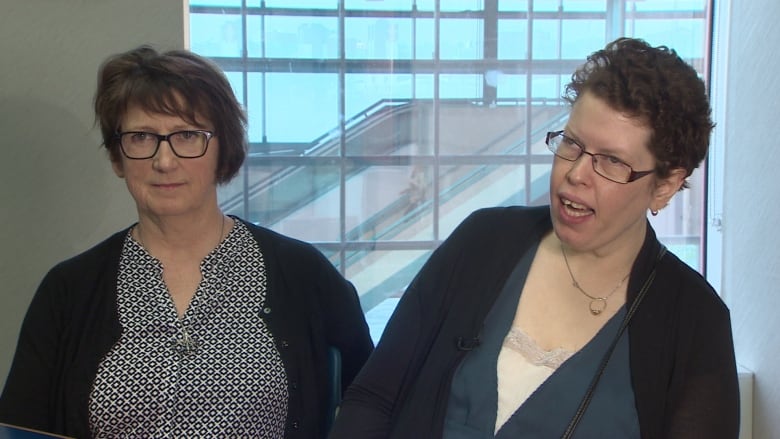People with disabilities have a right to live in the community, not institutions, argues lawyer

Almost 20 years — that's how long human rights lawyer Vince Calderhead says his clients with disabilities have been living in hospital-like institutions, waiting for a spot in community housing.
Calderhead is leading the three-year-long legal battle in the groundbreaking human rights that began Monday in Nova Scotia, which seeks to move people with disabilities out of institutions into small group homes.
In the tribunal hearing Calderhead argued the department of community services is breaking the Human Rights Act by not providing adequate access to community living for people like 45-year-old Joseph Delaney and 46-year-old Beth MacLean.
"The support and services they required simply weren't provided, and as a result they are stuck," Calderhead told The Current's Anna Maria Tremonti.
In their opening arguments, the Nova Scotia government told the board of inquiry that no one has an unfettered right to government housing of their choosing, but he said this argument ignores the issue at the heart of the hearing.

According to Calderhead, this case is not about housing — it's about equal access to social assistance for everyone.
"In its provision for social services to low-income people, the government has failed to do an adequate job of accommodating people with disabilities — it's dramatically inferior," Calderhead said.
But the biggest problem he points to is that within the umbrella of social services, no other group faces these kind of wait times. He sees this as definitive discrimination against people with disabilities.
He said a client has been "waiting needlessly" in an institution for 17 years.
"You wouldn't apply and be found eligible for social assistance and then be told you're on a wait list — not just for a week, or two weeks, but for 10-15 years — that would not happen elsewhere," Calderhead explained.
According to the Canadian Association for Community Living there are about 30,000 adults with an intellectual disability currently living in congregate residential facilities or group homes.
An additional estimated 10,000 adults living with an intellectual disability under the age of 65 are living in nursing homes, hospitals, psychiatric facilities, long term care facilities, institutions.
"And yet, the government seems to feel that's completely acceptable for people with disabilities… That's discrimination against people with disabilities and it's very stark," he added.
Far-reaching implications
This is not solely a Nova Scotia-based issue but Canada-wide, says Krista Carr, executive vice president of the Canadian Association for Community Living.
"Canada was one of the first signatories to the U.N. Convention on the Rights of Persons with Disabilities in 2007, and ratified the convention in 2010," she told Tremonti.
"That convention clearly states in Article 19 that people with disabilities have a right to live in the community with the support they need."
But 11 years since the signing of the convention, Carr said "we haven't made anywhere near the progress we need in recognizing that peoples with a disability do have a right to get support to live in the community like others."
Carr told Tremonti that institutionalization reflects how people with disabilities are perceived.
"Rather than looking at people with disabilities as full citizens, we seem to see people with disabilities as not being full citizens."
For both Calderhead and Carr, this tribunal case could set a precedent for people living with disabilities not only in Nova Scotia, but for the whole country.
"The implications of this case could be far reaching," said Carr.
"What's sad is that we have to get to this point — that people with disabilities have to use the court system to have their rights respected and recognized."
In a statement to The Current, The Department of Community Services in Nova Scotia expressed that they couldn't speak directly to the complaint because it is before the Human Rights Board of Inquiry, but went on to say:
"It is important to note the department is well underway to transform its programs with a focus on community-based supports including a plan for more community-based, small-option housing. Housing is critically important to all Nova Scotians and our government is committed to closing larger residential settings...It will take time to fully understand the complexities of moving program participants safely into the community and making sure they have associated supports such as access to day programs, medical professionals, and community activities."
Listen to the full segment near the top of this page, where you can also share this article across email, Facebook, Twitter and other platforms.
This segment was produced by Liz Hoath, Alison Masemann and Halifax Network Producer, Mary-Catherine McIntosh.